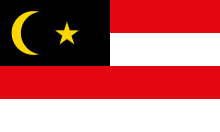Pattani United Liberation Organization
The Pattani United Liberation Organization (also Patani United Liberation Organization, Thai องค์กร ปลดปล่อย สห ปัตตานี หรือ พู โล , PULO for short , United Liberation Organization Pattani ) is an active separatist group in southern Thailand . She fights for a free and independent Pattani, by which she means the entire Islamic south of Thailand (i.e. the area of the former Sultanate of Patani ). It is considered to be the most militant underground movement in Thailand.
history
The Pattani United Liberation Organization was founded in India in 1968 , reportedly under the leadership of Kabir Abdul Rahman (Bira Kotanila), a Pattani Malay scholar who served as chairman until his death in 2008.
PULO sees itself as the (later) successor to the independence efforts of the southern provinces from the Kingdom of Ayutthaya , which took place when Ayutthaya was completely destroyed by the Burmese in 1767 . The recently called for Islamic State includes the historical sultanate of Pattani, i.e. Pattani, Narathiwat , Yala , Songkhla and Satun . However, only about 30% Muslims live in Songkhla, while Satun was actually part of Kedah and shows no support for the secession from Thailand.
The increasing politicization of Thai students after the restoration of the military dictatorship in Thailand in 1976 attracted many Muslims to the PULO to pursue the idea of the independence of the southern provinces. There were organized attacks on Thai bases and government institutions in the south, as well as bombings in Bangkok . The terrorists were trained at the PLO training camps in Libya and Syria .
In the second half of 1992 the movement split into three factions:
- PULO Leadership Council, led by Arong Muleng; she wielded a dagger in her flag,
- PULO Army Command Council in support of Kabir Adbul Rahman, led by Hajji Hadi Bin Ghazali and Hajji Sama-ae Thanam,
- a group led by Abu Yasir Fikri with the largest base, the only one with sufficient credibility to represent the PULO in the organization of the Islamic Conference .
In 1995 the cracks between the factions became so great that Arong Muleng's group split off and worked as PULO 88 , while the other group traded under Abdul Rahman as Pulo Keris (PULO dagger).
The level of support for PULO varied over the decades, but never endangered the central government in Bangkok. Since 2009, PULO has been making attempts to resolve the conflict politically. She makes demands on the Thai government, such as B. on the recognition of Islamic law in the southern provinces.
Terrorist actions
In addition to the aforementioned terrorist actions against government institutions and in Bangkok, PULO was also responsible for sporadic bomb attacks on the railroad in Hat Yai , in which three people were killed and seventy-six injured in August 1992. In March 1994 there was another attack on the railway bridge between Hat Yai and Chana .
More recently, fire and bomb attacks against Buddhist institutions and monks have occurred in order to incite religions against one another. (See conflict in southern Thailand )
literature
- Michael Leifer: Dictionary of the modern politics of South-East Asia. London: Routledge 1996. ISBN 0-415-13821-3 .
Individual evidence
- ^ Michael Leifer: Dictionary of the modern politics of South-East Asia . London: Routledge 1996. ISBN 0-415-13821-3 . Article: "Pattani United Liberation Organization (PULO)".
- ↑ Archived copy ( Memento of the original dated May 30, 2013 in the Internet Archive ) Info: The archive link was inserted automatically and has not yet been checked. Please check the original and archive link according to the instructions and then remove this notice.



